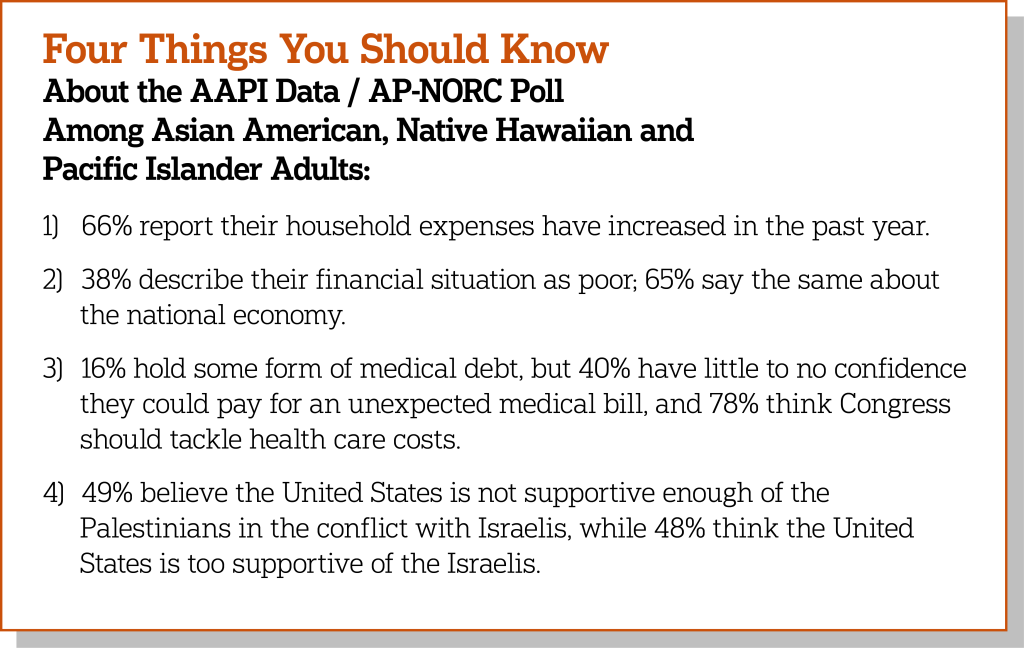
January 30th, 2024
Two-thirds of Asian American and Pacific Islander adults are feeling the strain of increased expenses.
Despite promising economic reports from the Federal Reserve, just 30% of Asian American, Native Hawaiian and Pacific Islander (AAPI) adults are very confident in their ability to keep up with their expenses according to a new AAPI Data/AP-NORC Center poll. Fully 23% have little or no confidence. About a quarter are confident in their ability to cover an unexpected medical bill (26%) or have enough retirement savings (22%). Even fewer are confident about finding a job if they want to change roles (19%). Similar shares of all U.S. adults lacked confidence in October 2023 when these questions were last put to the general population.
The survey also reveals that 2 in 3 AAPI adults have seen their household expenses increase in the past year, while nearly half (44%) reported their savings have decreased. Nearly a third held off on a major purchase in the last year due to higher interest rates, matching the share of all U.S adults (31%) who said the same.
A greater share of AAPI adults believes the economy in the United States is at least somewhat good (35%), compared to 30% of U.S. adults. Still, nearly two-thirds (65%) describe it as poor. Sixty-two percent describe their own financial situation as good. Democrats are more likely than Republicans to be optimistic on both fronts.
Overall, AAPI communities are less pessimistic than the general public about the way things are going in the country overall (45% and 55%), the national economy (42% and 54%), and that their personal finances are unlikely to improve in the next year (20% and 25%).
Most AAPI adults disapprove of President Biden’s handling of inflation (67%), the economy (58%), and student debt (54%), while a majority approve of his handling of jobs (55%). The general public is more negative about Biden’s approach to the economy (65%), but just about the same as AAPI communities regarding student debt (58%).
On foreign policy issues, about half of AAPI adults believe that the United States is not supportive enough of Palestinians in the conflict with Israelis, with a nearly identical share thinking the United States is too supportive of Israelis. Forty-five percent of AAPI adults believe the United States is not supportive enough of Muslim communities in the United States, but just 26% say the same about the country’s Jewish communities.
Forty percent across AAPI communities consider Israel a partner to cooperate with yet believe the country does not share U.S. interests and values, while 36% consider it an ally that shares U.S. interests. Few perceive it as a rival (11%) or an adversary (10%). Similar shares of all U.S. adults said the same in November 2023, the last time the question was asked of the general population.
About half of AAPI adults view India as primarily a U.S. partner that does not share U.S. interests and values, but most say Japan is an ally that does share U.S. interests and values. About a third of AAPI adults see China as either a rival or an adversary and a quarter consider it a partner of the United States.
AAPI adults aged 60 and older are more likely to view Israel as an ally than all of their younger AAPI counterparts (50% vs. 32%). They are also more likely than AAPI adults under 30 to see Japan as an ally (66% vs. 41%) and regard China as an adversary (43% vs. 21%).

The nationwide study was conducted by The AP-NORC Center for Public Affairs Research and AAPI Data from December 4–11, 2023, using the Amplify AAPI Monthly survey drawing from NORC’s Amplify AAPI® Panel designed to be representative of the U.S. Asian American, Native Hawaiian, and Pacific Islander household population. Online and telephone interviews were offered in English, the Chinese dialects of Mandarin and Cantonese, Vietnamese, and Korean with 1,091 Asian American, Native Hawaiian, and Pacific Islanders aged 18 and older living in the United States. The margin of sampling error is +/- 4.5 percentage points.



